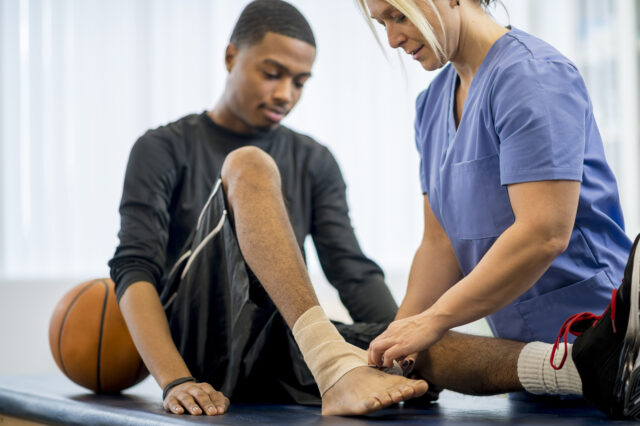Kick off the season with an annual sports physical

The beginning of a new school year also brings a new sports season filled with tryouts, practices and competition. Sports can play a huge part of your child’s school year, which is why an annual sports physical should be at the top of the to-do list each fall.
“For 40 to 50 percent of students, the sports physical is the only contact they have with a physician,” said Jeremy Coleman, MD, who specializes in family medicine and primary care sports medicine at UF Health Family Medicine – Yulee and UF Health North.
These yearly appointments help the physician establish a baseline for a healthy child. Throughout the year, children are typically seen for infections or injuries, which is why the physical is so important. However, an annual exam is different from a sports physical. Sports physicals focus less on vaccinations and growth development, and focuses more on prior injuries and the rehabilitation required for those injuries.
“They also don’t do musculoskeletal exams with the annual physical,” said Jeffrey Brunelli, MD, medical director of UF Health Orthopaedic Surgery – North. “It’s really a screening tool so the physician knows where the athlete stands prior to the athletic competition for the year. It also rules out kids who might have hypertrophic cardiomyopathy.”
Hypertrophic cardiomyopathy (HCM) is caused when part of the heart muscle is thicker than the other sections. This can often affect young athletes, which is why a sports physical is extremely important. The physician will make note of any symptoms that could indicate HCM such as chest pain, light-headedness with exertion or a heart murmur.
Sports physicals should be conducted eight weeks prior to the start of the season, which allows time for any potential health problems to be corrected. A detailed family history is also important to share with the physician.
“If you have had any relatives with prior heart conditions, make sure that is explicitly stated,” Coleman explained. “There should really be an understanding with the student, parent, physician and coach to know that this is the one time you have to really get it right. So let’s make sure that we are open and honest, and that we do our due diligence to make sure any problems are taken care off.”
If children are involved in contact sports, parents should talk with their child about how important it is not to brush off a head injury, especially if they experience a bad headache, changes in alertness or loss of consciousness. These may be signs of a concussion.
If a parent has concerns about their child’s health, taking them to a physician who specializes in sports medicine for their sports physicals may be the better option. But all pediatricians and family medicine doctors are skilled to do the initial assessment.
“Sports physicals are important because they allow the physician and the child to speak once a year to understand their health status prior to participation in an athletic event,” said Brunelli. “We can diagnose any underlying problems and prevent the child from having a catastrophic injury.”
Schedule your child’s sports physical today by calling 904-633-0411 or visit UFHealthJax.org/Primary-Care.